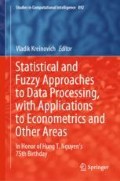Abstract
There have been many criticisms of null hypothesis significance testing (NHST), including important ones made by Dr. Hung Nguyen. The goal of this chapter is to honor Dr. Nguyen for his important scientific contributions by introducing a new argument against NHST that complements the arguments he already has made. Specifically, NHST aficionados sometimes justify NHST by arguing that it is based on Popper’s falsificationist philosophy of science, which has a history of being very popular among scientists in the 20th century, and much of this popularity continues into the 21st century. In contrast, I argue that NHST is inconsistent, rather than consistent, with Popper. I further argue that there are problems with Popper’s philosophy, at least in the simple form used to justify NHST.
Access this chapter
Tax calculation will be finalised at checkout
Purchases are for personal use only
Notes
- 1.
In addition, we wrote an article together that included authors from many countries [14].
- 2.
The interested reader can consult Einstein [4] for an accessible account, in Einstein’s own words.
- 3.
Some hypotheses are directional, in which case the alternative hypothesis has a 50% chance of being correct, rather than a close to 100% chance of being correct. But even 50% cannot be considered to approach anything close to what Popper would have said to be bold.
- 4.
To be fair, although auxiliary assumptions are generally brought up to criticize Popper or neo-Popperian falsificationist philosophies, Trafimow [13] showed that they are problem for verification too. That is, empirical victories can be credited to the theory or to auxiliary assumptions. The ambiguity creates problems for theory verification and not just theory falsification.
- 5.
There are more sophisticated falsificationist positions, such as that suggested by Andersson [1]. However, to my knowledge, nobody has used Andersson’s more sophisticated approach to justify NHST. In my judgment, even more sophisticated falsificationist positions are incompatible, rather than compatible, with NHST.
References
G. Andersson, Criticism and the history of science: Kuhn’s, Lakatos’s, and Feyerabend’s criticisms of critical rationalism (E. J. Brill, New York, 1994)
R.A. Berk, D.A. Freedman, Statistical assumptions as empirical commitments, in Law, Punishment, and Social Control: Essays in Honor of Sheldon Messinger, ed. by T.G. Blomberg, S. Cohen, 2nd edn. (Aldine de Gruyter, 2003), pp. 235–254
P. Duhem, The Aim and Structure of Physical Theory (P.P. Wiener, Trans). (Princeton University Press, Princeton, NJ, 1954). (Original work published 1906)
A. Einstein, Relativity: The Special and the General Theory (Robert W. Lawson, Trans.) (Crown Publishers, New York, 1961)
I. Lakatos, The Methodology of Scientific Research Programmes: Philosophical Papers, vol. 1 (J. Worrall, G. Currie, Eds.). (Cambridge University Press, Cambridge, United Kingdom, UK, 1978)
P.E. Meehl, Theoretical risks and tabular asterisks: Sir Karl, Sir Ronald, and the slow progress of soft psychology. J. Consult. Clin. Psychol. 46, 806–834 (1978)
H.T. Nguyen, On evidential measures of support for reasoning with integrated uncertainty: a lesson from the ban of p-values in Statistical Inference, in Integrated Uncertainty in Knowledge Modelling and Decision Making. IUKM 2016, ed. by V.N. Huynh, M. Inuiguchi, B. Le, B. Le, T. Denoeux. Lecture Notes in Computer Science, vol. 9978 (Springer, Cham, 2016), pp. 3–15
K.R. Popper, The Logic of Scientific Discovery (Basic Books, New York, NY, 1959)
T. Raykov, G.A. Marcoulides, Introduction to psychometric theory. (Routledge, London, UK, 2011)
D. Trafimow, Hypothesis testing and theory evaluation at the boundaries: surprising insights from Bayes’s theorem. Psychol. Rev. 110, 526–535 (2003)
D. Trafimow, The theory of reasoned action: a case study of falsification in psychology. Theory Psychol. 19, 501–518 (2009)
D. Trafimow, Are measurement theories falsifiable and should we care? Theory Psychol. 23(3), 397–400 (2013)
D. Trafimow, Implications of an initial empirical victory for the truth of the theory and additional empirical victories. Philos. Psychol. 30, 411–433 (2017)
D. Trafimow, V. Amrhein, C.N. Areshenkoff, C.J. Barrera-Causil, E.J. Beh, Y.K. Bilgiç, R. Bono, M.T. Bradley, W.M. Briggs, H.A. Cepeda-Freyre, S.E. Chaigneau, D.R. Ciocca, J.C. Correa, D. Cousineau, M.R. de Boer, S.S. Dhar, I. Dolgov, J. Gómez-Benito, M. Grendar, J.W. Grice, M.E. Guerrero-Gimenez, A. Gutiérrez, T.B. Huedo-Medina, K. Jaffe, A. Janyan, A. Karimnezhad, F. Korner-Nievergelt, K. Kosugi, M. Lachmair, R.D. Ledesma, R. Limongi, M.T. Liuzza, R. Lombardo, M.J. Marks, G. Meinlschmidt, L. Nalborczyk, H.T. Nguyen, R. Ospina, J.D. Perezgonzalez, R. Pfister, J.J. Rahona, D.A. Rodríguez-Medina, X. Romão, S. Ruiz-Fernández, I. Suarez, M. Tegethoff, M. Tejo, R. van de Schoot, I.I. Vankov, S. Velasco-Forero, T. Wang, Y. Yamada, F.C.M. Zoppino, F. Marmolejo-Ramos, Manipulating the alpha level cannot cure significance testing. Front. Psychol. 9, 699 (2018)
D. Trafimow, B.D. Earp, Null hypothesis significance testing and the use of P values to control the Type I error rate: the domain problem. New Ideas Psychol. 45, 19–27 (2017)
D. Trafimow, M. Marks, Editorial. Basic Appl. Soc. Psychol. 37, 1–2 (2015); D. Trafimow, M. Marks, Editorial. Basic Appl. Soc. Psychol. 38, 1–2 (2016)
D.W. Zimmerman, Probability spaces, Hilbert spaces, and the axioms of test theory. Psychometrika. 40, 395–412 (1975)
Author information
Authors and Affiliations
Corresponding author
Editor information
Editors and Affiliations
Rights and permissions
Copyright information
© 2021 The Editor(s) (if applicable) and The Author(s), under exclusive license to Springer Nature Switzerland AG
About this chapter
Cite this chapter
Trafimow, D. (2021). The Falsificationist Foundation for Null Hypothesis Significance Testing. In: Kreinovich, V. (eds) Statistical and Fuzzy Approaches to Data Processing, with Applications to Econometrics and Other Areas. Studies in Computational Intelligence, vol 892. Springer, Cham. https://doi.org/10.1007/978-3-030-45619-1_16
Download citation
DOI: https://doi.org/10.1007/978-3-030-45619-1_16
Published:
Publisher Name: Springer, Cham
Print ISBN: 978-3-030-45618-4
Online ISBN: 978-3-030-45619-1
eBook Packages: Intelligent Technologies and RoboticsIntelligent Technologies and Robotics (R0)

